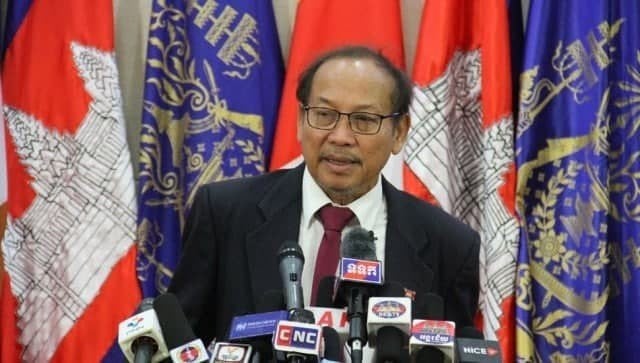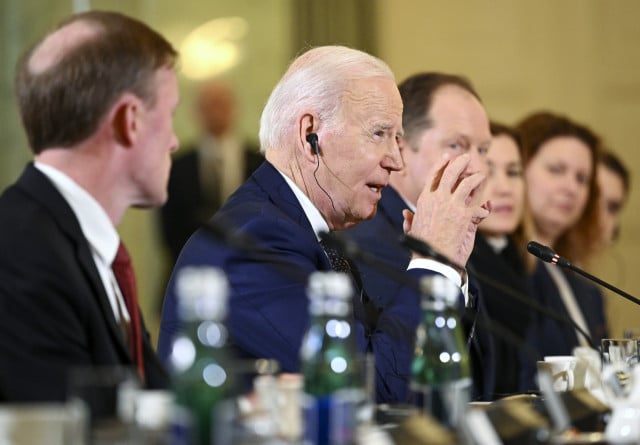Government Lashes Out at Transparency International’s Corruption Index

- By Teng Yalirozy
- January 26, 2022 2:53 PM
Government spokesperson Phay Siphan called the organization “pathetic” and accused Transparency International of exaggerating Cambodia’s corruption problems while not understanding the government
PHNOM PENH--The government has rejected Transparency International’s 2021 Corruption Perceptions Index (CPI) released on Jan. 25, saying Cambodia’s current strategy on tackling corruption was not reflected in the findings.
Government spokesperson Phay Siphan said he was disappointed and went on to claim that Transparency International was exaggerating the situation based on foreign influences.
Siphan called the organization “pathetic” for always highlighting corruption in Cambodia in a negative light and not providing an in-depth assessment of the Cambodian government’s actions.
“I, the Royal Government, do not accept it because it does not show the reality of Cambodia,” he said.
On Jan. 25, 2022, Transparency International released the 2021 Corruption Perceptions Index (CPI) in which Cambodia ranked 157 out of 180 countries analyzed with a score of 23 out of 100 possible points—100 being the best.
Cambodia ranked the worst for corruption in ASEAN and remains the third lowest-scoring country in the Asia-Pacific region, narrowing outperforming Afghanistan and North Korea.
Pech Pisey, Transparency International Cambodia’s Executive Director, said the index suggested that Cambodia had made some positive developments in the efforts to fight against corruption in the country—hence the additional two points picked up in the 2021 index compared with 2020.
Reforms on taxations have mildly improved the economy and business in relation to the risk of corruption, he said, but serious and systemic corruption remains endemic and authorities must double down their efforts to enforce the law more effectively.
Siphan retorted that the government has already reformed itself to be accountable and transparent, adding that he felt the government’s achievements in implementing a form of social accountability in the financial sector, among others, were significant.
“What is important in fighting major corruption is accountability. Bidding, the use of the national budget, and solicitation of the national budget have been made accountable,” he said, adding that he felt Transparency International and other organizations critical of the government simply didn’t understand the government’s anti-corruption strategy.
He then suggested that the more money going into Cambodia, the lower the risk of corruption as payments made through banks are more transparent and financial institutions can monitor this money.
“Accounting for money with accountability has brought a lot of revenue growth into the nation, so it is a factor that we are proud of,” he said without providing any figures.
Transparency International’s 2021 index found that there had been some degree of commitment from the government to improve public financial management and to reform public administration through the addition of digital platforms for public services, but the data did not suggest any improvement in Cambodia’s respect for democratic principles, the rule of law, the quality of policies or sustainable environmental development.
“They do not understand the strategy of the Royal Government. We started from education and organizing the structure with accountability and transparency,” Siphan said, adding that democracy was not relevant in the matter of corruption.
He pointed to the apparent accessibility of information regarding state land, state revenue and expenditure.
“The citizens can ask to see the information, whether the state spending is right, or those who receive the money is right,” he said. “With the accountability system that we set up, we can create a transparent society through the modernization of money and information systems.”
However, journalists have repeatedly called for greater access to information that should fall under the public domain, with spokespeople representing various government ministries—especially the Ministry of Land Management—consistently failing to make information available.
While Siphan claimed that the government has made information more readily and publicly available, the Law on Access to Information is yet to move beyond the draft stage, despite the government’s working group starting work on this law in 2015.
Seven years on and Cambodia has little to show for itself in making information available to the public for scrutiny or accountability, but even the most recent draft of the Law on Access to Information dated Aug. 20, 2019, has been widely derided by international lawyers for what was deemed “ambiguous” in the scope of documents that would be covered by the law and “broad” in terms of “exceptions to disclosure by public authorities.”
“The government’s commitment to adopting access to information legislation is a step in the right direction. A strong law could open up channels for combatting corruption, promoting accountability, and enabling public participation in official decision-making processes,” Matthew Bugher, head of the Asia Program at rights group ARTICLE 19, said in 2019. “However, the government has yet to incorporate key recommendations, despite a lengthy consultation process.”
Despite the Law on Access to Information remaining unfinished, Siphan cited its development—alongside the Anti-Corruption Law of 2010—as proof that Cambodia was becoming more transparent.
“This is the great principle of a society that dares to take responsibility for accountability because it is not a political will. We have gone far, and now we come to accountability in society,” said Siphan. “So, it lowers corruption.”
Pisey of Cambodia’s Transparency International chapter said that addressing the problem of corruption in Cambodia is possible only if the government and all those involved are committed and push for genuine rule of law, as well as respond to the findings or recommendations that organization has found, such as in 2021.
“If we can respond to the recommendations, we will be able to reduce corruption to another level,” he said.















